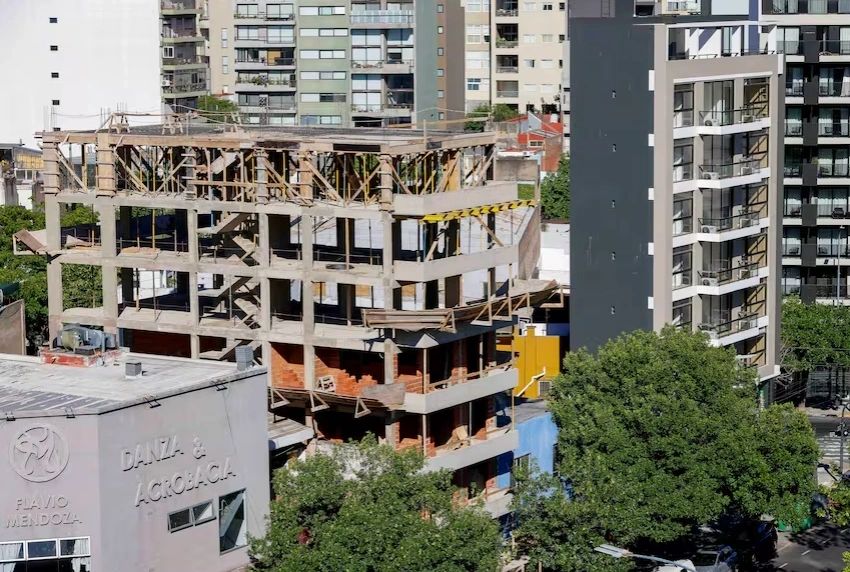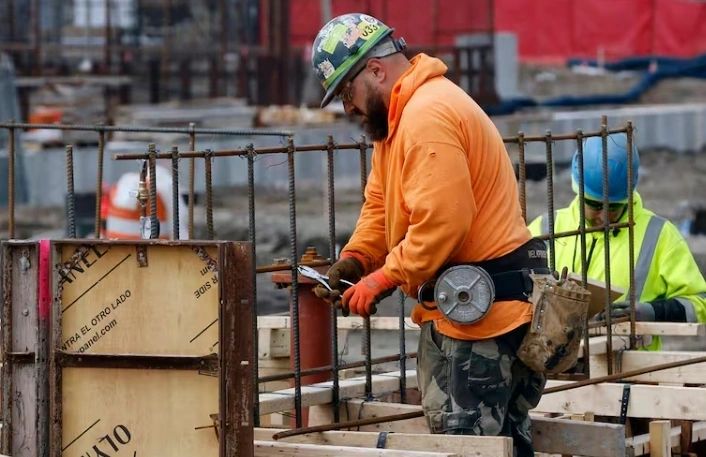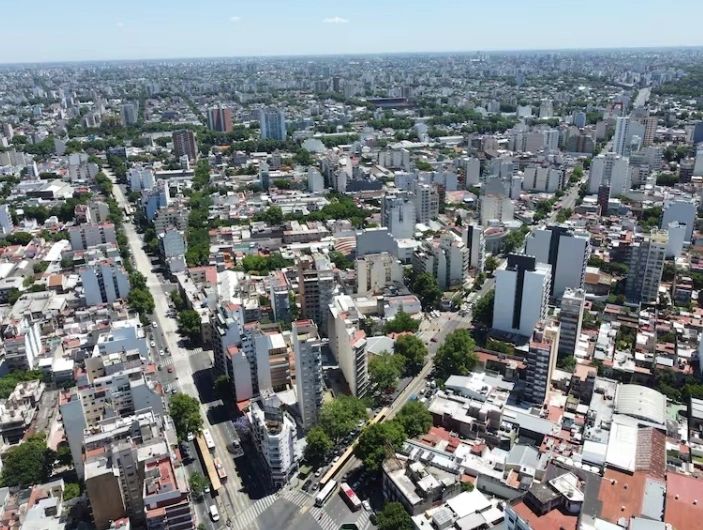BuySellBA
Administrator
Construction material prices in China and the impact of importing them into the country - La Nacion Propiedades

Source:

 www.lanacion.com.ar
www.lanacion.com.ar
May 27, 2025
Real estate developers who traveled to the East analyze the dilemma and whether it is really possible to import products and lower construction costs.
By Maria Josefina Lanzi

Although importing materials could help lower construction costs in Argentina, developers warn that there are other problems.Santiago Filipuzzi
A few weeks ago, Argentine real estate developers traveled to China with a clear objective: to find prices that would help lower construction costs in our country , in a context of growing trade liberalization in Argentina. And the panorama they encountered was very revealing.
"It's true: in China, India, Brazil, and other markets, materials are available at incredibly competitive prices. From panelized systems to sanitary fixtures, including industrialized technology, the offering is varied, modern, and efficient," said Mali Vázquez, executive director of the Chamber of Urban Developers (CEDU), one of the Argentines who traveled to the Asian country last month.

Industrialized materials from Asia and Brazil offer competitive prices and solutions on a global scale.Unsplash
The developers toured fairs, visited factories, analyzed construction solutions, and spoke with entrepreneurs who produce at scales that are difficult to imagine in our country. “I expected to find products similar to those we already know but at a better price; however, I found quality far superior to what I expected ,” shared Magdalena Day, founder and President of Grupo MDay, adding: “ I saw products that are 50% below the prices seen in Argentina.”
“Costs in China are 50% lower than here, and you find the same or even better quality,” agrees Juan Manuel Tapiola, CEO of the developer Spazios, who traveled to China last year.
"We find products with equivalent quality to those here at prices 80% cheaper than in Argentina," says Damián Tabakman, president of CEDU, even more highly.
At the same time, he warns that this price must also include the cost of travel to Argentina , the transfer itself, taxes, and other costs, in addition to the risk of subsequent claims against the buyer, who is located on the other side of the planet. "Many are studying the issue in depth, not only real estate developers, but also the domestic industry, which will begin to have another competitor , and also those who previously imported at high prices and sold here, who know that the developer can buy directly abroad ."

Construction costs have risen by 98% since October 2023.Michael Dwyer - AP
Tabakman also notes that it's important to keep in mind that Argentine developers often pay materials suppliers in square meters (giving them an apartment at the end of the project). "That's very good financially for the developer, but if they buy from China, they'll have to send all the money in cash," Tabakman adds.
The developer believes this could help lower construction costs, as materials will be cheaper, but "costs are one thing, prices are another. Demand for properties is increasing, and this will push prices up . Even if construction costs are lower, I don't think prices will decrease; in fact, I think they'll increase," he clarifies.
Although importing materials could help lower construction costs in Argentina, developers warn that other structural problems exist in the country that prevent costs from significantly decreasing.
" Today, Argentina is among the countries with the highest tax burden on construction in the world. The tax burden can exceed 40% of the total cost of a project, surpassing key items such as installations, structure, or finishes," adds Vázquez.

Many wonder if property prices will drop with the opening of imports.Gonzalo Colini
Day agrees with Vázquez and points out that taxes represent between 35% and 40% of the total cost of a project in Argentina. "Although reducing material costs by 50% could help lower property prices, very little is passed on to the final square meter, given that the largest impact of the price is borne by the construction structure and taxes," Day points out. At the same time, she is convinced of the need to lower costs in order to offer affordable products to the middle and lower-middle classes and address the housing shortage in Argentina. She also points out that work needs to be done in other areas, such as improving wages, so that more people can apply for a mortgage and achieve homeownership.
In this regard, Vázquez encourages work on other areas to achieve a more significant reduction in construction costs. These include tax reform, such as reducing VAT on new housing, and exempting gross income and reducing municipal taxes. He also proposes formalizing labor with incentives, such as reducing social security contributions for new hires. He encourages efficient public management, including measures such as the digitalization of permits and procedures or unified regulations that avoid arbitrary disparities between municipalities. He calls for financing to scale projects and the promotion of innovative construction systems developed in the country.
www.buysellba.com

Source:
Los precios de los materiales de construcción en China y el impacto de traerlos al país
Los desarrolladores inmobiliarios que viajaron a Oriente analizan el dilema y si es realmente posible importar productos y bajar los costos de construcción
May 27, 2025
Real estate developers who traveled to the East analyze the dilemma and whether it is really possible to import products and lower construction costs.
By Maria Josefina Lanzi

Although importing materials could help lower construction costs in Argentina, developers warn that there are other problems.Santiago Filipuzzi
A few weeks ago, Argentine real estate developers traveled to China with a clear objective: to find prices that would help lower construction costs in our country , in a context of growing trade liberalization in Argentina. And the panorama they encountered was very revealing.
"It's true: in China, India, Brazil, and other markets, materials are available at incredibly competitive prices. From panelized systems to sanitary fixtures, including industrialized technology, the offering is varied, modern, and efficient," said Mali Vázquez, executive director of the Chamber of Urban Developers (CEDU), one of the Argentines who traveled to the Asian country last month.

Industrialized materials from Asia and Brazil offer competitive prices and solutions on a global scale.Unsplash
The developers toured fairs, visited factories, analyzed construction solutions, and spoke with entrepreneurs who produce at scales that are difficult to imagine in our country. “I expected to find products similar to those we already know but at a better price; however, I found quality far superior to what I expected ,” shared Magdalena Day, founder and President of Grupo MDay, adding: “ I saw products that are 50% below the prices seen in Argentina.”
“Costs in China are 50% lower than here, and you find the same or even better quality,” agrees Juan Manuel Tapiola, CEO of the developer Spazios, who traveled to China last year.
"We find products with equivalent quality to those here at prices 80% cheaper than in Argentina," says Damián Tabakman, president of CEDU, even more highly.
At the same time, he warns that this price must also include the cost of travel to Argentina , the transfer itself, taxes, and other costs, in addition to the risk of subsequent claims against the buyer, who is located on the other side of the planet. "Many are studying the issue in depth, not only real estate developers, but also the domestic industry, which will begin to have another competitor , and also those who previously imported at high prices and sold here, who know that the developer can buy directly abroad ."

Construction costs have risen by 98% since October 2023.Michael Dwyer - AP
Tabakman also notes that it's important to keep in mind that Argentine developers often pay materials suppliers in square meters (giving them an apartment at the end of the project). "That's very good financially for the developer, but if they buy from China, they'll have to send all the money in cash," Tabakman adds.
Will it help lower property prices?
Tapiola explains that, with the opening of imports, the cost of materials could drop. “Ten days ago, news broke that Aluar lowered the prices of its products by 25% . It's an Argentine company that makes aluminum, a material used in construction openings and an input that represents the main cost of these products. Now, with competition and external pressure , they are no longer the only players in the market and are forced to lower prices,” Tapiola points out.The developer believes this could help lower construction costs, as materials will be cheaper, but "costs are one thing, prices are another. Demand for properties is increasing, and this will push prices up . Even if construction costs are lower, I don't think prices will decrease; in fact, I think they'll increase," he clarifies.
Although importing materials could help lower construction costs in Argentina, developers warn that other structural problems exist in the country that prevent costs from significantly decreasing.
" Today, Argentina is among the countries with the highest tax burden on construction in the world. The tax burden can exceed 40% of the total cost of a project, surpassing key items such as installations, structure, or finishes," adds Vázquez.

Many wonder if property prices will drop with the opening of imports.Gonzalo Colini
Day agrees with Vázquez and points out that taxes represent between 35% and 40% of the total cost of a project in Argentina. "Although reducing material costs by 50% could help lower property prices, very little is passed on to the final square meter, given that the largest impact of the price is borne by the construction structure and taxes," Day points out. At the same time, she is convinced of the need to lower costs in order to offer affordable products to the middle and lower-middle classes and address the housing shortage in Argentina. She also points out that work needs to be done in other areas, such as improving wages, so that more people can apply for a mortgage and achieve homeownership.
In this regard, Vázquez encourages work on other areas to achieve a more significant reduction in construction costs. These include tax reform, such as reducing VAT on new housing, and exempting gross income and reducing municipal taxes. He also proposes formalizing labor with incentives, such as reducing social security contributions for new hires. He encourages efficient public management, including measures such as the digitalization of permits and procedures or unified regulations that avoid arbitrary disparities between municipalities. He calls for financing to scale projects and the promotion of innovative construction systems developed in the country.
www.buysellba.com

